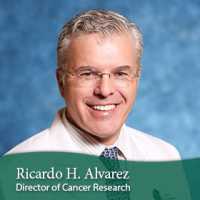
28 Nov CTCA Reports Thousands of Patients Have Had Treatment Based On Precision Biomarkers
MedicalResearch.com Interview with:

Dr. Alvarez
Ricardo Alvarez MD MSc
Medical Director of the Breast Cancer Center
Director of Cancer Research
Cancer Treatment Centers of America, CTCA
Atlanta
MedicalResearch.com: What is the background for this study? What are the main findings?
Response: “The background of this study comes from five years of experience in one of our precision medicine programs that was launched in 2013 and this is the experience of a group of personnel from a hospital that helps physicians in five different hospitals that are a part of the CTCA network and for physicians who order a next generation sequencing test.
In this particular report, we have only one vendor, and that is Foundation Medicine and we analyze three different genomic platforms, Foundation One test, Foundation Act and Foundation One Hem.
In total, approximately 8,800 tests have been analyzed and that was the presentation at ESMO 2018. It’s important that the Precision Medicine Program (PMed) helps physicians to identify actionable and potentially actionable targets for the result of this test so patients can be treated with targeted therapy, and this can be done by selecting clinical trials or recommending patients to be treated off-label agents.
When we say off label, meaning that they are not specifically FDA-approved drugs for this indication that we are treating.”
MedicalResearch.com: What should readers take away from your report?
Response: “The main take away is that in five years we collected a total of 8,800 tests, this is approximately 7,600 patients that have been tested with molecular platforms and the large proportion of these patients have been treated, finally, with targeted therapy. That is very important because we believe that patients treated with genomic bio-markers, or any type of bio-markers, the outcomes of these patients are always superior in terms of response rate compared to patients treated with unselected approach. There have been multiple reports showing the difference has been also metanalysis with a large, large number of patients showing when you select a population based on their bio-marker and you treat with a targeted therapy drug, they get a higher response rate, better survival with this treatment and the duration of their response is longer compared to patients who are treated without these bio-markers or without the selection.”
MedicalResearch.com: What recommendations do you have for future research as a result of this work?
Response: “Our study was presented in Europe, where it is a completely different scenario. Our colleagues in Europe congratulated our team, specifically the precision management team, because this work was in five different hospitals in five different states and were responsible for collecting in a short amount of time, a large number of patients. This is not a common practice in Europe, for several reasons, in Europe the use of genomic platforms is very limited to academic centers or still used as an investigational tool, and the second important point is patients have no access to targeted therapies as “off-label” as we use in the United States.
So, the main development of this project is the next step where we will offer outcomes of patients who will discuss a presentation of how a program is settled down in a hospital the next step is to identify outcome of these patients. Specifically, how these patients benefit when they are treated with targeted therapy.”
MedicalResearch.com: Is there anything else you would like to add?
Response: Yes, I think it is important to mention that this study has not been funded by any external source. This study was supported by the PMed program and Research Department for CTCA, that this is a national cancer network in five hospitals in five different states and what we need is the organization of commercially available genomic platforms to treat patients and the real world. This is a report of how we treat patients in 2018 in the United States in the community practice.”
Citation:
ESMO abstract:
[wysija_form id=”3″]
[last-modified]
The information on MedicalResearch.com is provided for educational purposes only, and is in no way intended to diagnose, cure, or treat any medical or other condition. Always seek the advice of your physician or other qualified health and ask your doctor any questions you may have regarding a medical condition. In addition to all other limitations and disclaimers in this agreement, service provider and its third party providers disclaim any liability or loss in connection with the content provided on this website.
Last Updated on November 28, 2018 by Marie Benz MD FAAD
